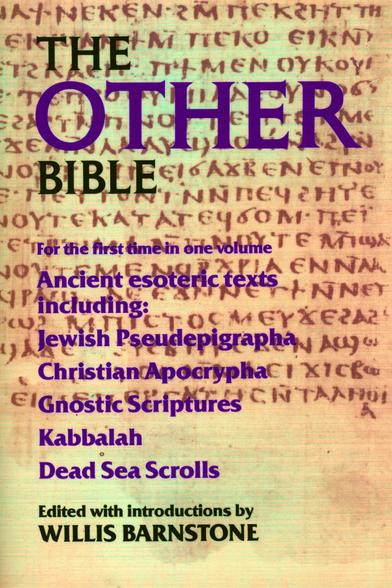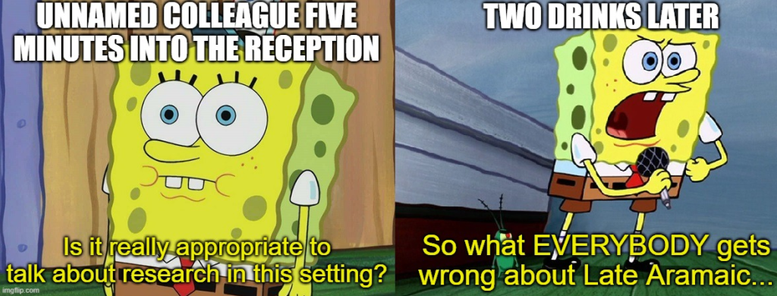SBL International: some talks I attended
(Live tweeting conferences is out; post hoc blogging about them is the new thing.)
Last week saw the 2024 Society of Biblical Literature International Meeting held at the Vrije Universiteit Amsterdam, advertised with pictures like this:
despite being held about an hour’s walk from where that picture was taken, at a place that looks like this:
It’s nicer on the inside.
As an International Meeting, this was considerably smaller than the SBL’s Annual Meetings in the US, with only(!) some 550 attendees. Unlike the gargantuan Annual Meeting I attended in 2018, I actually found this quite manageable and even enjoyable. And like the Annual Meeting, there were lots and lots of talks and other events. Here’s an overview of some of the ones I attended, in chronological order.
After some admirably concise and entertaining opening words by Steed Davidson (SBL Executive Director) and Bert-Jan Lietaert Peerbolte (VU Amsterdam), the conference kicked off on Sunday afternoon with a reception. Great snacks, 4/5, would be received again.
Monday talks:
- John Will Rice analyzed passages in the books of Kings on “the sin of Jeroboam” and argued that at an earlier stage, this was Jeroboam (I)’s establishment of a “Battei Bamoth” sanctuary at an unnamed location, with non-Levitical priests, and a different festival calendar. This was later conflated with a separate tradition on Josiah destroying an altar at Bethel to make Jeroboam responsible for building that altar and putting a golden calf idol there. Rice suggests this was done to avoid the awkwardness of having Josiah destroying an altar that was now believed to have been built by the patriarch Jacob.
- Jorik Groen gave a great talk (as his co-supervisor and one-time coauthor, I’m completely unbiased) exploring and explaining the different uses of Biblical Hebrew בּוֹא and English to come. Slides here.
- Drawing on previous work by Yochanan Breuer and new research, Yosef Ofer presented some cases where the cantillation of the Masoretic Text reflects a mix of competing traditions. The main case study was on Isaiah 45:1, where cantillators disagreed about whether God is calling the Persian king Cyrus his Messiah or not:
- A session on the Semantics of Ancient Hebrew Database talked about the semantics of עֶבֶד ‘slave’ or ‘servant’ (Cornelius Haposan Sinaga), חוֹתָם ‘seal’ (Marjo Korpel), and the hapax legomenon חַשְׁמַנִּים, possibly ‘amethysts’ (a posthumous suggestion by Meindert Dijkstra presented by Paul Sanders).
- Ivri Bunis and myself presented something we’ve been meaning to work on for a while now, connecting his observations on medial deixis pronouns with prefixed hallā- with some stuff I’ve done on similar-sounding presentatives in Hebrew and other Semitic languages. Slides here.
- In the same session, Dong-Hyuk Kim presented a recent analysis that says English “adverbs of time and place” like here, there, then, now and so forth should actually be seen as intransitive prepositions and applied it to Biblical Hebrew (which is harder, as adverbs are less clearly marked than in English). It sounds weird, but I was fully convinced.
Tuesday talks:
- Nili Samet asked: whose voice do we hear in the pessimistic, life-negating “Better Than” proverbs in Qohelet 7:1–9? Not Qohelet’s: it contradicts his philosophy elsewhere in the book. Not a later editor’s, either, as the passage is well integrated into the book and Qohelet comments on it. Nor that of classical wisdom, as it contradicts the world view of Proverbs, for example. Drawing on parallels in Tractate Avot and Ben Sira, Samet makes a plausible case that Qohelet is critically quoting another wisdom school from the Hellenistic period, that would end up influencing pre-Rabbinic and early Rabbinic wisdom literature.
- Kyle Young reconsidered Alexander Sperber’s choice of a manuscript on which to base his edition of Targum Onqelos and concludes that while it’s not perfect, it’s acceptable until something better comes along.
- In my second talk this conference, I went before the Pentateuch section to ask them why, if you believe the E source is a thing, Genesis 14 can’t be its missing beginning. For the (mostly European) scholars present, the answer is “we don’t believe in E so who cares lol” (to be fair, I’m not sure I do either). But they were very nice about it, had helpful methodological pointers, and seemed to be convinced by some possible connections I suggested between Genesis 14 and other texts. Slides here.
- The last session I attended on Tuesday focused on Qumran Cave 11, with non-Biblical texts that were published by a Dutch team. Eibert Tigchelaar (KU Leuven 🥳) gave us some historical background on two (given time constraints, mainly one) of the leading scholars, one of whom was problematic (as in publishing 1940 pamphlets on “The Jewish Question” problematic). David Shepherd showed that the Job “Targum” from Cave 11 does not yet employ a Targumic translation technique, like earlier translations into Aramaic. And Rebekka Luther also talked about the Job Targum (pace Shepherd), arguing that its translator purposefully edited it to change (improve?) the picture of Job it presents.
Wednesday talks:
- Charbel El-Khaissi presented his ongoing PhD research on the generalization of the definite article in Syriac, showing that this was a gradual development in some environments. I like the data-heavy approach.
- Margaretha Folmer (Leiden University 🥳) presented three marginal linguistic features in Targumei Onqelos (Pentateuch) and Jonathan (Prophets). Besides being very interesting in their own right, that they appear in the same way in both targumim supports the view that these are written in practically the same form of Aramaic, which bears on the history of their translation and transmission.
- Emanuel Tov, in his eighties now, is the doyen of Dead Sea Scrolls research, so it was cool to attend his talk on correctional practices at Qumran. Lots of ḋȯṫṡ and strikethroughs.
- Against the dominant (in Europe) view that the Priestly source ends in Leviticus or even Exodus, Bruna Velcic made a strong case that the spies narrative in Numbers 13 and 14 really is Priestly too (and not just post-Priestly), based both on form and contents. No conclusion on where P does end.
- I got to chair a session featuring four speakers from Scriptura (Elizabeth Robar, Ian Atkinson, Drew Longacre, and Joseph Habib), talking about poetry, mainly Psalm 68, a major source of headaches for everyone involved.
Thursday was a half day. I attended both of the sessions on the study of pre-modern Judaism in the Low Countries, including:
- Jonathan Stökl (Leiden University 🥳)’s enigmatically, even ominously titled talk “Elefantine…” considered different models for the religious identity of the Judean(?) community on the southern border of Achaemenid Egypt. Should we call them Jews, Yahwists, or something else altogether?
- Willem Smelik presented on the practice of adding cantillation marks to targum manuscripts and possible implications for liturgical and study practice.
- Joachim Yeshaya (until recently[?], KU Leuven 🥳) told us about Abraham Ibn Ezra, one of the great commentators and poets of Sepharad, and the connection between his poetry and his commentary on the Song of Songs.
Finally, a shoutout to Matthew Saunders, who attended the conference without presenting, but who also maintains a very in-depth blog on Semitic languages.
All in all, it was great to have so many people come hang out and present their work at a half-an-hour train ride from my house. They should do that more often. I look forward to seeing a lot of the ideas presented last week in print soon and, hopefully, the people presenting them too.
#Aramaic #Bible #conference #DeadSeaScrolls #Exodus #Genesis #Hebrew #Isaiah #Kings #linguistics #news #Numbers #Pentateuch #Psalms #Qohelet #SongOfSongs #Targum




